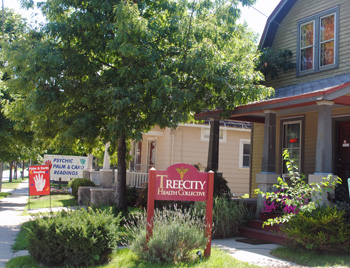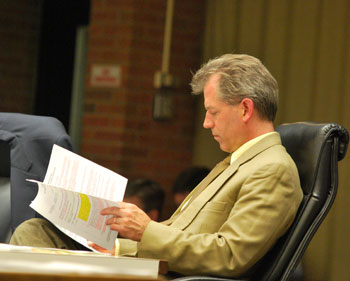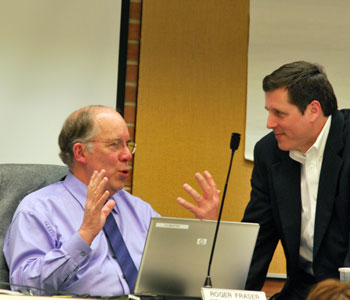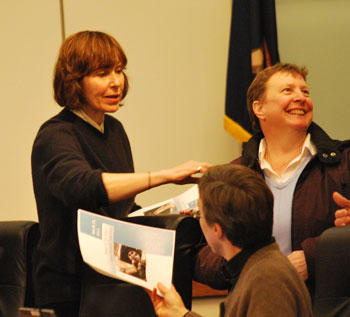No on Chalmers Parking, Maple Cove Delayed
Ann Arbor planning commission meeting (May 1, 2012): A nearly 3.5-hour meeting was devoted in large part to public commentary – hearings on two projects drew two dozen speakers.
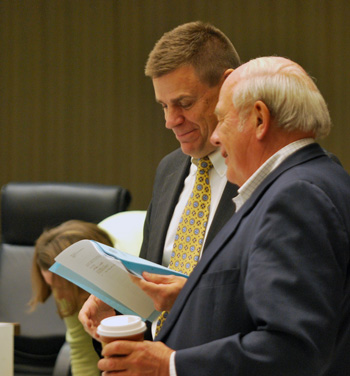
Len Nadolski, left, talks with city councilmember Tony Derezinski before the start of the May 1, 2012 Ann Arbor planning commission meeting. Nadolski owns the Chalmers Place Retail Center on Washtenaw Avenue and hopes to add a parking lot behind the center. The proposal was rejected by the planning commission, on which Derezinski serves. (Photos by the writer.)
About half of those speakers came out to oppose a parking project for the Chalmers Place Retail Center on Washtenaw Avenue, located next to Paesano restaurant in the former Arbor Dodge lot. The owner – Len Nadolski of Howell – asked to rezone a vacant parcel behind the center to P (parking), from its current single-family residential zoning. He said the center has been unable to lease all of its stores because tenants are concerned about a lack of parking.
Commissioners expressed sympathy for the owner, but voted against recommending the rezoning. The majority of commissioners did not feel that the situation warranted overriding the master plan, which calls for that property to be zoned residential. Erica Briggs said the situation added urgency to plans to make the Washtenaw Avenue corridor more safe and amenable to walking and biking.
Eric Mahler cast the lone vote in favor of rezoning. He said he normally wouldn’t support a proposal that was essentially “spot zoning,” but in this case he voted for the plan because he didn’t see any viable alternatives for the owner.
Another project that drew public commentary had previously been recommended for approval by the commission: Maple Cove Apartments & Village development, located on North Maple near Miller Road. The commission had approved the project at its March 20, 2012 meeting. But that vote was rescinded when it was discovered that Scio Township residents on Calvin Street had not been included in an original public notice mailed out for the commission’s March meeting.
Nearby residents voiced several concerns about the project – including density, flooding, aesthetics, traffic and a lack of sidewalks from North Maple back to the seven houses. Those issues were echoed by some of the commissioners, who also complained about the lack of responsiveness from the property owner, Muayad Kasham of Dynasty Enterprises. He has not attended the commission’s meetings to address concerns.
But it was the two proposed entrances off of North Maple – separate entrances for the apartments and the single-family homes – that prompted the most discussion among commissioners, and ultimately the move to postpone. Wendy Woods pointed out that the city’s traffic engineer had advised that a single entrance would be preferable. The city code allows for two entrances, however, based on the property’s lineal frontage. The owner has indicated a commitment to two entrances in order to market the apartments and single-family homes separately, and the city code allows for two entrances based on the property’s lineal frontage.
No date has been set for when the project will next appear on the planning commission agenda.
The commission also approved the city’s 2013-2018 capital improvements plan (CIP), with only minor modifications from the previous year. But commissioners voted to postpone action on a master plan update – they’re expected to discuss it at a retreat set for Tuesday, May 29.
The final item of the meeting was dispatched quickly, as commissioners recommended rejecting a proposed revision to the city’s medical marijuana zoning ordinance. The proposal – recommended by the medical marijuana licensing board – was to strike one sentence from the zoning ordinance: “Medical marijuana dispensaries and medical marijuana cultivation facilities shall be operated in compliance with the MMMA (Michigan Medical Marijuana Act).” Commissioners expressed caution about the implications of eliminating the sentence, with Mahler stating that the change would authorize illegal uses, and would have severe consequences for the city. [Full Story]




